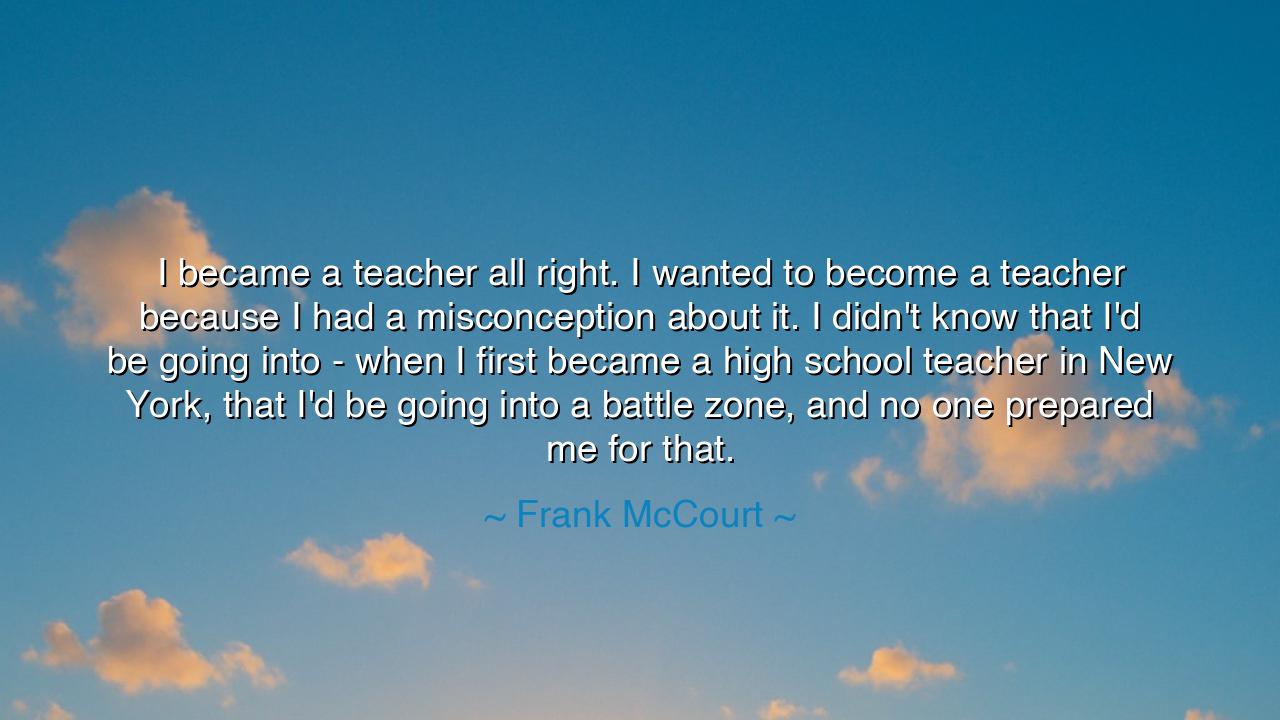
I became a teacher all right. I wanted to become a teacher
I became a teacher all right. I wanted to become a teacher because I had a misconception about it. I didn't know that I'd be going into - when I first became a high school teacher in New York, that I'd be going into a battle zone, and no one prepared me for that.






“I became a teacher all right. I wanted to become a teacher because I had a misconception about it. I didn't know that I'd be going into—when I first became a high school teacher in New York—that I'd be going into a battle zone, and no one prepared me for that.” Thus spoke Frank McCourt, the Irish-American writer who penned Angela’s Ashes and whose own career as a teacher in New York City schools revealed to him truths harsher and deeper than any classroom lesson. His words pierce with honesty: the dream of teaching as noble guidance gave way to the reality of struggle, conflict, and survival, a reality so stark he likened it to a battle zone.
The meaning of this quote lies in the clash between expectation and reality. McCourt entered the profession with the tender hope that teaching was a serene calling, a place of nurturing young minds with the grace of books and ideas. Yet what he found was a world of resistance—students hardened by poverty, chaos in the classroom, the indifference of a society that had abandoned its schools. He was not prepared for the shouting, the defiance, the sheer exhaustion. His “misconception” was not naïve idealism alone, but a reflection of how little society tells its teachers about the weight of the battlefield they must walk into each day.
To call the classroom a battle zone is not exaggeration but truth. A teacher wages war against ignorance, against despair, against the creeping shadows of hopelessness in young lives. The battle is not fought with swords or guns, but with patience, courage, and words. McCourt, like countless teachers, stood before students not merely to impart knowledge, but to defend the very idea that education could matter. The wounds of this battle are invisible but deep: the fatigue of endless preparation, the heartbreak of students lost, the discouragement when progress seems small. And yet, like soldiers, teachers return each day to the front line.
History gives us mirrors of such struggle. In the years after the American Civil War, freed slaves gathered in rough classrooms to learn letters by candlelight, while teachers—some former soldiers, some missionaries—risked violence from those who hated the idea of black children learning to read. Those teachers, too, stepped into battle zones of their own. They were spat upon, threatened, driven from towns, yet they persisted. Like McCourt, they had perhaps imagined teaching as noble simplicity, but found it instead to be a struggle demanding endurance, bravery, and sacrifice.
The origin of McCourt’s words is in his own life as an immigrant boy raised in hardship, and later as a teacher trying to bridge the distance between literature and the raw lives of his students. His honesty strips away illusions: the work of teaching is not merely standing at a desk, but confronting the rawness of human struggle. He discovered that no book, no training, no preparation could shield him from the reality of classrooms filled with wounded spirits, restless bodies, and unmet needs. And yet, though he describes it as a battle, he did not abandon the field—he remained, and in time became not only a teacher, but also a chronicler of the truth of teaching.
The lesson is one of both caution and inspiration. To those who dream of teaching, McCourt’s words are a reminder: do not enter expecting ease. Expect instead resistance. Expect hardship. But also expect transformation—both of your students and yourself. For it is in the very fire of this battle zone that true teachers are forged, learning resilience, compassion, and strength that no “misconception” could ever imagine.
Therefore, dear listener, let McCourt’s testimony prepare you. Whatever your calling—whether to teaching, to service, to leadership—do not expect a garden of roses. Expect instead the battlefield. But do not fear it. Arm yourself with patience, with courage, with unshakable belief in the value of your work. For though no one may prepare you for the storm, it is within the storm that your strength will be revealed. And in that revelation, as McCourt himself showed, lies not despair, but a story worth telling, a life of meaning, and a legacy that endures beyond the classroom walls.






AAdministratorAdministrator
Welcome, honored guests. Please leave a comment, we will respond soon